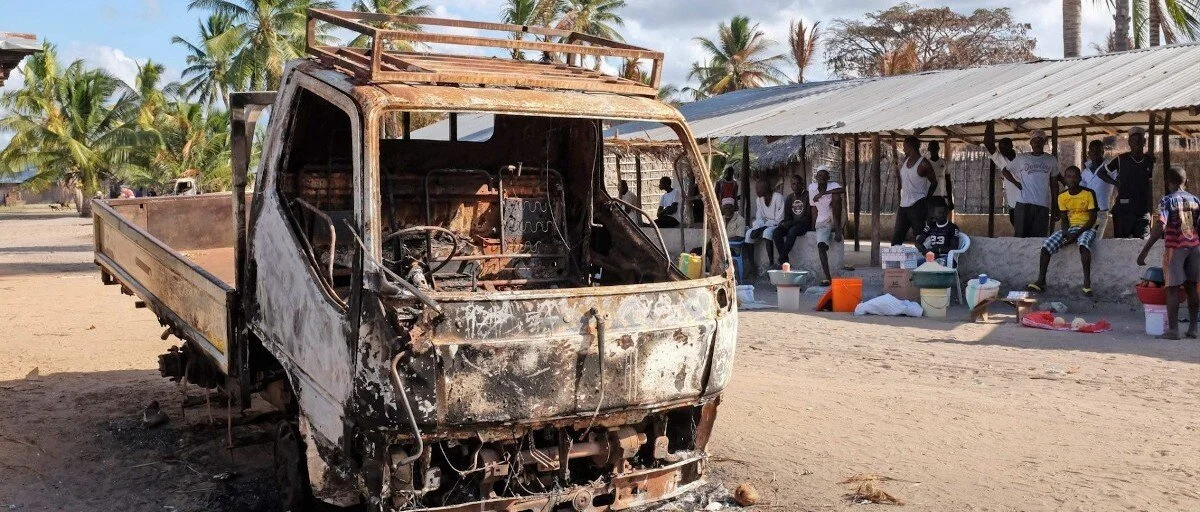On October 5, 2017, a group of armed men with machetes and firearms attacked the port village of Mocímboa da Praia, in the province of Cabo Delgado, northern Mozambique. Locally, the group was known as Al-Shabbab, but with no relation to the militant group operating in Somalia. Others designate the group as Ansar al-Sunna. When the insurgents carried out their first attack in 2017, they targeted police posts and government infrastructure.
Although there are several authors and experts who seek to explain the emergence and nature of the armed group that now terrorizes Cabo Delgado, little is known about their motivations and objectives. The group grew rapidly and began to spread its attacks to villages and towns close to the coast, murdering defenseless citizens, cutting off access roads, and destroying public and private properties.
From the beginning, the Mozambican government has always underestimated the scale of the problem that was arising in Cabo Delgado. On several occasions, authorities prevented coverage and access for journalists who wanted to report on the issue. Ibraimo Mbaruco, a community radio journalist, was detained by the military as a form of censorship because he reported on the conflict and to this day no one knows where he is. Overall, national radio and television said little about the conflict. Mozambicans have therefore relied mainly on social media networks and international media to get news about their own country.
In 2019, insurgent attacks intensified and gained an international dimension. Foreign military companies came in, including from the Wagner Group, a Russian company with close links to the Vladimir Putin regime. In the same year, the Islamic State assumed responsibility for attacks on the coastal village of Mocímboa da Praia, thus establishing its connection with the militant groups operating in Cabo Delgado. The Russians were not very successful, and after suffering casualties, they decided to leave the country. In its place, South African mercenaries from the Dyck Advisory Group have come in.
In the year 2020, insurgents attacked more towns and villages, a fact that created a humanitarian crisis, with thousands of displaced people taking refuge in destinations across Mozambique, from Mueda and Montepuez, to Palma, Pemba and Nampula. Humanitarian agencies estimate that the conflict has now displaced more than 700,000 people. ACLED, a non-governmental organization that monitors global conflict, has reported the deaths of more than 1300 civilians. All parties involved in the conflict have been accused of committing human rights violations against civilians, including by Amnesty International.
The Afungi Peninsula, where the French multinational Total is implementing the Liquefied Natural Gas project, was considered one of the safest places by the end of last year. But an attack by insurgents on the village of Quitunda, near Total operations, forced the company to evacuate its workers. However, it was unthinkable for insurgents to attack Vila de Palma. But that happened on the afternoon of March 24, 2021, when insurgents took over various parts of the village while murdering civilians and destroyed local infrastructure. About 60,000 people who lived in Palma sought refuge in the bush and in surrounding villages, while others embarked for Pemba by sea. Telephone communication with Palma was cut. It is unclear how many people lost their lives. Thousands of people are now in the bush without food, water and medical care. Humanitarian agencies have suspended support for Palma due to the violence. Total again suspended their operations and evacuated its work, a move that could delay, or worse, threaten the production of natural gas in Mozambique.
The Mozambican government remains silent about the Palma tragedy. Neither has it accepted foreign military intervention to contain the increasingly violent insurgency. But more than foreign intervention, Cabo Delgado is in desperate need of humanitarian intervention. It needs a social intervention that allows citizens to enjoy the wealth of resources that the province has. It needs an intervention that involves marginalized young people vulnerable to extremism and poverty. These key sectors must feel included in the national economy and in the projects that are underway in the province.
Without these crucial interventions, the future of Cabo Delgado will remain uncertain and likely plagued by violence. The government can no longer stand idly by, as this problem is likely to grow worse and many more lives destroyed in the process.
Tomás Queface is a Mozambican researcher and activist who holds a master’s degree in Anthropology and Development from the University of Sussex. Follow him on Twitter: @TomQueface
DISCLAIMER: The views expressed in this publication do not necessarily reflect the views of Vanguard Africa or the Vanguard Africa Foundation.

